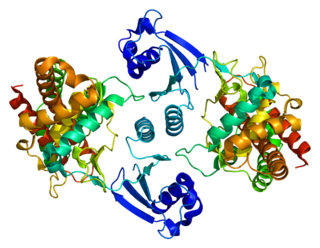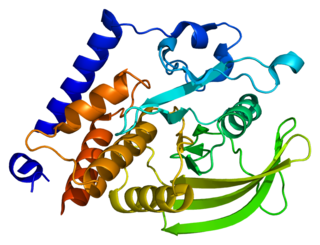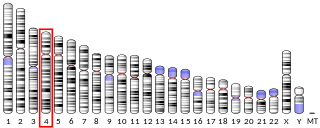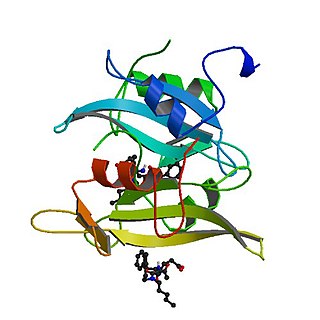
Proto-oncogene c-KIT is the gene encoding the receptor tyrosine kinase protein known as tyrosine-protein kinase KIT, CD117 or mast/stem cell growth factor receptor (SCFR). Multiple transcript variants encoding different isoforms have been found for this gene. KIT was first described by the German biochemist Axel Ullrich in 1987 as the cellular homolog of the feline sarcoma viral oncogene v-kit.

Growth factor receptor-bound protein 10 also known as insulin receptor-binding protein Grb-IR is a protein that in humans is encoded by the GRB10 gene.

Non-receptor tyrosine-protein kinase TYK2 is an enzyme that in humans is encoded by the TYK2 gene.

Fibroblast growth factor receptor 4 is a protein that in humans is encoded by the FGFR4 gene. FGFR4 has also been designated as CD334.

Protein tyrosine kinase 2 beta is an enzyme that in humans is encoded by the PTK2B gene.

Low molecular weight phosphotyrosine protein phosphatase is an enzyme that in humans is encoded by the ACP1 gene.

Tyrosine-protein phosphatase non-receptor type 12 is an enzyme that in humans is encoded by the PTPN12 gene.

Proto-oncogene tyrosine-protein kinase FER is an enzyme that in humans is encoded by the FER gene.

PITSLRE serine/threonine-protein kinase CDC2L1 is an enzyme that in humans is encoded by the CDC2L1 gene.

Cytoplasmic tyrosine-protein kinase BMX is an enzyme that in humans is encoded by the BMX gene.

Choline kinase alpha is an enzyme that in humans is encoded by the CHKA gene.

Growth factor receptor-bound protein 14 is a protein that in humans is encoded by the GRB14 gene.

Tyrosine-protein kinase BLK, also known as B lymphocyte kinase, is a non-receptor tyrosine kinase that in humans is encoded by the BLK gene. It is of the Src family of tyrosine kinases.

Insulin receptor substrate 4 is a protein that in humans is encoded by the IRS4 gene.

Dual specificity protein phosphatase CDC14A is an enzyme that in humans is encoded by the CDC14A gene.

Tyrosine-protein phosphatase non-receptor type 18 is an enzyme that in humans is encoded by the PTPN18 gene.

Dual specificity protein phosphatase 16 is an enzyme that in humans is encoded by the DUSP16 gene.

Rap1 GTPase-GDP dissociation stimulator 1 is an enzyme that in humans is encoded by the RAP1GDS1 gene.

Diacylglycerol kinase theta is an enzyme that in humans is encoded by the DGKQ gene.

Tyrosine-protein kinase CSK also known as C-terminal Src kinase is an enzyme that, in humans, is encoded by the CSK gene. This enzyme phosphorylates tyrosine residues located in the C-terminal end of Src-family kinases (SFKs) including SRC, HCK, FYN, LCK, LYN and YES1.
























